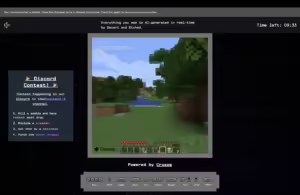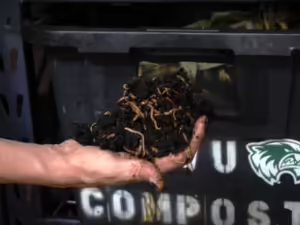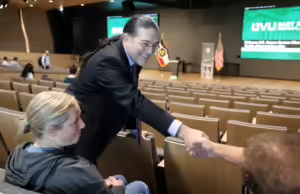Close Up of a UVU Recycling Bin | Photo by Jared Wilkerson
Recycling Coordinator, Dylan Genes and Assistant Director of Facility Services, Isaac Reaveley discuss the state of Recycling at UVU.
UVU’s Approach to Recycling: Are We Getting Greener?
Utah Valley University (UVU) prides itself on being the “green” school, marketing an environmentally friendly brand. In April of 2018, the Faculty Senate drafted a resolution with seven pledges promoting sustainability, recycling, and reducing the carbon footprint at UVU. This resolution was ratified by the President’s Council in June that same year. The first paragraph states:
“UVU has placed great importance upon building a highly efficient and sustainable campus and strives to be the ‘greenest’ university in Utah in more than just school colors.” As stated in the resolution.
The emphasis on “green” at UVU being synonymous with sustainability and, more specifically, recycling, yet what exactly is UVU doing to recycle materials. Are these measures making us any “green-er” or are they a waste of time, money, and effort?
The First Recycling Coordinator
Dylan Genes is the first ever Recycling Coordinator at UVU. His position, department and title were established in Oct. of 2023. The Recycling Department was subsequently formed as a subdivision within the Facilities Department. Genes and his team oversee all the management of recycling of cardboard, paper, aluminum, and plastics on campus. They use compactors and balers to process and sell the cardboard, paper, and aluminum to brokers, and they contract with Republic to take care of plastics and “mixed recycling.”
Republic is a waste removal vendor that UVU contracts with to take care of garbage disposal, but they also take care of plastics and mixed recycling. However, according to Genes, working with Republic has been somewhat problematic because of their lack of transparency. He states:
“You may already know that once it leaves here, we do not know if it is getting recycled. For the sake of ease, they could be throwing it away and say it is being recycled. And based on the research that I have done, that is a problem with most places, and most of these places are not transparent. So, we are doing what we can here with sorting so that they have no excuse.”
Genes and his team must sort through recyclables to assure that the material gets recycled. This is the case due to the stringent contaminant policy surrounding recycling, prohibiting certain materials from being recycled despite initial assumptions. “We need to roll out more [information], like pizza boxes, everybody thinks that can be recycled with regular cardboard, but it cannot. Like grease, if there’s oil blotches on it. That is a contaminant. We cannot recycle that.”
This is repeated by Gene’s boss, Assistant Director of the Facilities Department, Isaac Reaveley. “If they get a load, and they find X amount of contaminants in there, they dump everything.” Said Reaveley about Republic.
Transparency Challenges with Republic
There is added pressure on Genes and his team to empty and sort recyclables to minimize the chance that a contaminant might ruin a load when Republic takes it. Even then, there’s little verification that the materials are being recycled. Genes have attempted to communicate with Republic, requesting data and statistics, however, they have allegedly been difficult to communicate with. “It’s just been a struggle.” Genes says. “I am at odds with myself because I am going ‘Well how do I present [at Sustainability week] this year, because I don’t have any data.”
Progress in In-House Recycling
Even with struggles between Republic, Genes and the Recycling Department are still making leaps and bounds in terms of processing recyclables in house, selling bales to brokers and making money which goes directly to the school. Especially in comparison to previous processes before the Recycling Department was its own organization.
“Just based off what I am seeing now because we have eleven bins instead of two. We are doing three times as many bales. We are clearly putting up numbers that we have never seen before.” said Genes. “It has been more efficient than ever. I can guarantee that.”
And that is only one side of it. Genes recognizes the latent potential of the students here at UVU and has worked with several clubs and organizations like the Rotary Club and UIMF to help with recycling efforts. Genes states “We are trying to utilize the minds of our students through student clubs to get them more involved. The goal as a coordinator and my past experience with student clubs is we need to involve the students.” According to Genes, student involvement will be a key to a “greener” university.
Despite how new the Recycling Department is and the size of Gene’s team, the six of them take out, sort, and process all recyclables across campus. Genes expresses the importance of having a small team now. “I’d love more staff, but the idea is that we’re trying to show that we can do it with less.”
Reorganizing Recycling Efforts
The Assistant Director of the Facilities Department, Isaac Reaveley had decided to form the Recycling Department into its own sub-division as a result of inefficiency with the school’s past efforts to recycle. His goal is to better organize our recycling efforts on campus. “We’re sorting and streamlining a lot more now, and we’re actually selling it now compared to what we were doing then.” Said Reaveley. Before this decision, the responsibility of recycling passed through multiple departments around UVU. It started out underneath the student center people, and then it was taken over by the custodial department before it split into its own division. “I felt like it was better to break off of custodial. Custodial is just taking trash out, and it is more people management instead of resource management.” Said Reaveley.
Support from Other Universities
UVU is not alone in its efforts towards recycling either. We have received multiple offers and acts of generosity from our neighboring universities.
Utah State University (USU) offered UVU a paper baler, which can shred and bale the paper at the same time, and Brigham Young University (BYU) offered to give us an aluminum compactor. But, according to Reaveley, there just isn’t enough space on campus for all of the new equipment.
“If you want to hear our biggest struggle here at UVU, it is space. If you want to have a good recycling program you have to have space where you can sort and store and all that stuff, and we just don’t have that type of space here for us. If you want to go look at other universities who are able to streamline their stuff and hold on to things and sell it and get a larger return. They have space to do it.” Said Reaveley.
Future Recycling Goals
The goal of Reaveley and Genes is to rely on in-house equipment for our recyclables and as little on vendors as we can, so we can either use the materials or sell them to brokers and make back some returns. Reaves says, “You’re not wasting money by recycling, you’re making money.” To those who view the recycling efforts on campus as an expenditure than a support.
Genes added, “And again, I mean this when I say this, I am doing as much as I can with as little as possible. That is a big deal for the whole sustainability effort. And I think we are doing a great job.” Said Genes.
Conclusion: A Work In Progress

In conclusion, UVU is not completely “green.” Not just yet. But, despite complications with contractors, logistics and limited space to work, the continued efforts of our Facilities department, our Sustainability department and our students make Dylan Genes and Isaac Reaveley confident that we will be.
There will be a Sustainability event on National Recycling Day, November 15 and throughout that week.
If students or faculty have any questions about recycling at UVU, contact Dylan Genes at 10595190@uvu.edu or call 801-669-1833.








